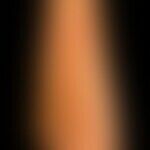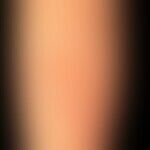Synonym(s)
HistoryThis section has been translated automatically.
Freudenthal, W 1930
DefinitionThis section has been translated automatically.
Primary cutaneous amyloidosis (keratinamyloidosis) with dense papules and very intense lesional pruritus. Recently, some authors understand itching as the primary stimulus of amyloid deposition, which is reactively followed by the described skin changes with subepidermal deposition of amyloid (due to the traumatic permanent damage caused by scratching). See also amyloidosis.
You might also be interested in
Occurrence/EpidemiologyThis section has been translated automatically.
Common in Asians and Africans. Also in Caucasians, but rather rare.
EtiopathogenesisThis section has been translated automatically.
Unknown.
Familiar occurrence.
Principle: Apoptotic keratinocytes (this apoptotic process is a normal degradation process in the skin) convert their alpha helix into a beta leaflet structure from unexplained reasons. As a result, these keratin structures can no longer be phagocitated by macrophages. As it were, they remain in the dermis as clumsy, non-degradable ("keratinamyloid" or amyloid K) organic material. This process is not reversible.
ManifestationThis section has been translated automatically.
m:w=3:2; usually higher age.
LocalizationThis section has been translated automatically.
Extremities extensor sides, especially lower legs (86% of cases)
less frequently arms (10%) and
Back
ClinicThis section has been translated automatically.
Permanent, severe to excessive, lesional itching(itching = main symptom)
Very hard, skin-colored to brown, mostly grouped, warty-rough or lichenoid shiny, 0.2-0.4 cm large, partially excoriated nodules with a tendency to confluence, resulting in 3.0-5.0 cm large or even larger hard plaques with a fielded or verrucous surface.
A special form is biphasic cutaneous amyloidosis, in which papular and patchy skin changes occur simultaneously.
In larger studies, the symptoms of lichen amyloidosus were present 6-20 months before the diagnosis was made.
HistologyThis section has been translated automatically.
Homogeneous eosinophilic plaques in the papilla tips, acanthosis, hyperkeratosis, hypergranulosis; lateral displacement of the reticulum cones. Traces of amyloid are often also found in the reticular dermis. The amyloid can be detected with crystal violet staining (metachromasia) or Congo red staining (green glow in polarized light). Immunohistological detection of cytokeratin positive keratin filaments (!).
Differential diagnosisThis section has been translated automatically.
External therapyThis section has been translated automatically.
Improvement of symptoms by external glucocorticoids, e.g. 0.1% betamethasone(e.g. Betagalen, Betnesol) triamcinolone(e.g. Triamgalen, R259 ) or 0.05% clobetasol ointment or cream (e.g. Dermoxin, R054 ) under occlusion for several hours. Clinical improvement over several days to weeks.
For smaller foci, glucocorticoids intralesionally such as triamcinolone acetonide crystal suspension(e.g., Volon A, 10-40 mg together with 3-5 ml lidocaine or mepivacaine draw up and apply intradermally! in a fan shape).
In case of extensive foci, e.g. on the back, dermabrasio or laser therapy,CO2 laser or erbium laser may be recommended. Theoretical principle: elimination of amyloid, which cannot be degraded by the organism, by the abrasive effect with the consecutive exudative inflammatory reaction. Therapeutic effects (no itching) for months to years.
Good effects are reported from local therapy with 50% dimethyl sulfoxide solution(DMSO) R079 (1 time/day for several months). Under this therapy, marked improvement of itching; regression of lichenoid papules within 8-12 weeks.
Single observations reported good effects of tacrolimus.
Internal therapyThis section has been translated automatically.
Acitretin (Neotigason) initially 0.5 mg/kg bw, continuous therapy with 0.1-0.2 mg/kg bw tentatively as monotherapy or in combination with one of the surgical procedures (not very successful in our own experience).
In severe cases with pronounced pruritus, cyclophosphamide (Endoxan) 50 mg/day may be tried as continuous therapy.
Note(s)This section has been translated automatically.
Of note is the observation that families with multiple endocrine neoplasia type 2A (= Sipple syndrome [MEN type 2A]) and familial medullary thyroid carcinoma (FMTC) with activating mutations in the RET oncogene have a higher incidence of lichen amyloidous.
Furthermore, associations between lichen amyloidous and Kimura disease have been described (Teraki Y et al. 2002; Shankar S et al. 2004). In one case, treatment with cyclosporine dramatically improved both Kimura disease and lichen amyloidosus lesions. Although Kimura disease and lichen amyloidosus are both rare, distinct entities, approximately 20 cases have been described to date in which Kimura disease and lichen amyloidosus occurred together.
LiteratureThis section has been translated automatically.
- Beier C et al (1996) Lichen amyloidosus in unusual localization. Akt Dermatol 22: 67-70
- Borrowman TA et al (2003) Cutaneous nodular amyloidosis masquerading as a foot callus. J Am Acad Dermatol 49: 307-310.
- Carlesimo M et al (2011) A case of lichen amyloidosus treated with acitretin. Clin Ter 162:e59-61
- Dowling GB, Freudenthal W (1939) Lichen amyloidosus. Proc R Soc Med 32:1029-1030.
- Freudenthal W (1930) Amyloid in the skin Archiv für Dermatologie und Syphilis 162: 40-94.
- Hashimoto K et al (1965) Lichen amyloidosus. J Inv Dermatol 45: 204-219
- Hung CC et al (2003) Unusual skin mainifestation of cutaneous amyloidosis. Dermatology 207: 65-67
- Özkaya-Bayazit E et al (1997) Local DMSO treatment of macular and papular amyloidosis. Dermatologist 48: 31-37
- Ruzicka T et al (1990) Cutaneous amyloidoses. Dermatologist 41: 245-255
- Salim T et al. (2005) Lichen amyloidosus: a study ofclinical, histopathologic and immunofluorescence findings in 30 cases. Indian J Dermatol Venereol Leprol 71:166-169.
- Shankar S et al (2004) Co-existence of lichen amyloidosus and angiolymphoid hyperplasia with eosinophilia. Clin Exp Dermatol 29:363-365.
- Teraki Y et al (2002) Lichen amyloidosus associated with Kimura's disease: successful treatment with cyclosporine. Dermatology 204:133-135.
- Wagner G et al (1988) Cryotherapy and etretinate (Tigason)-two treatment options for lichen amyloidosus. Akt Dermatol 14: 205-208
- Weyers W (1995) Lichen amyloidosus-disease entity or scratch effect. Dermatologist 46: 165-172
Incoming links (17)
Acitretin; Acral papular mucinosis; Amyloidosis macular cutaneous; Amyloidosis, papular; Amyloidosis, perforating cutaneous; Clobetasol propionate cream hydrophilic 0.05% (nrf 11.76.); Colloidalmilium; Dmso solution 50% (for external therapy); Hypertrophic Lichen planus; Keratinamyloidoses; ... Show allOutgoing links (27)
Acitretin; Amyloid; Amyloidosis (overview); Betamethasone; Chronic prurigo; Clobetasol-17-propionate; Clobetasol propionate cream hydrophilic 0.05% (nrf 11.76.); Cutaneous amyloidosis (overview); Cyclophosphamide; Dermabrasion; ... Show allDisclaimer
Please ask your physician for a reliable diagnosis. This website is only meant as a reference.























